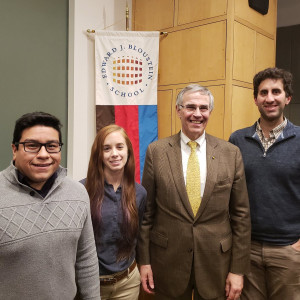By Brian Canter Scientists have recently felt pressure from partisan attacks on government science funding agencies. Yet many of these same agencies have received funding boosts in the past two years. The public is supportive of basic research, but sometimes questions the motivations and interests of scientists, due to a general disconnect between the two communities. In fact, many Americans cannot name a living scientist nor a place where scientific research is conducted. Crucially, scientists, especially those in the early stages of their career, must work to close the chasm between researchers and the public. However, it can be difficult for graduate students to start making a difference. One way to close this chasm is to provide opportunities for graduate students to interface with members of the public and government officials. At the same time, it is important for graduate students at Rutgers to be knowledgeable about the government’s scientific priorities, strategies, and actions. Having this knowledge helps graduate students present their scientific research as a return on the public’s investment. As Mary Woolley, CEO of Research!America wrote, “the science community must work to ensure those trained in science are fluent in the ‘public context of science’, inclusive of the political context.” Current Rutgers graduate students are not trained to be fluent in the “public context of science”, nor the political context. Training to be fluent in both contexts necessitates learning more about science policy. Therefore, it helps to have a student-run science policy group at Rutgers. With this in mind, Science Policy and Advocacy at Rutgers (SPAR) was relaunched last year. This past semester I’ve had the privilege of leading a group of students as co-president of SPAR. SPAR was previously the Rutgers Chapter of the National Science Policy Group, which was founded in 2014. That group established relationships with legislative staffers on annual Capitol Hill visits. Unfortunately, in 2016 and 2017 many students that were engaged in the group graduated, which left the once-active chapter largely dormant. 
Science Policy and Advocacy at Rutgers members pose with Rush Holt after his talk at the Bloustein School. From left to right (Johnny Quispe, Emily Atieh, Rush Holt, and Brian Canter).
Fast forward to March, 2018: I had just attended the American Association for the Advancement of Science Catalyzing Advocacy in Science and Engineering (CASE) workshop in DC. There, I learned how the government operates and how to make my case for graduate education and federal funding for scientific research. Feeling empowered, I wanted to facilitate change at Rutgers through engaging more of the graduate student population in science policy. I knew I needed help in making an impact. Fortunately, I had also completed SciPhD in the month before the CASE workshop. During an informal networking event, I met a recent Rutgers alum, who was active in the student-run science policy group while he was in school. He connected me with Emily Atieh, who was also interested in revitalizing a science policy group at Rutgers. Emily is a graduate student in the Chemistry department. It was this connection, made through leveraging my network, that ultimately paved the way for the relaunch of SPAR. SPAR believes in the following four statements: 1) an understanding of the scientific method and engagement with scientists by the public will encourage critical thinking and trust in the science community 2) effective science communication is an acquired skill that can be fostered at the graduate level 3) legislation should be supported by sound science 4) government support is necessary for progress in scientific research Going back to the first paragraph of this piece, I believe that the disconnect between scientists and the public is caused by a lack of trust. This lack of trust manifests itself in the discussions on vaccines, genetically modified organisms, and climate change as well as criticisms of federally funded scientific research for political purposes. Scientists bear some responsibility for this lack of trust. Asking for money from the public and then communicating our findings using jargon and technical language facilitates misunderstandings. When one dines at a restaurant, one asks for a glass of water, not an aliquot of dihydrogen monoxide. Most importantly, this disconnect can be mended. Scientists can control how they are perceived and how their work is perceived by the public. Substantial research pioneered by Gordon Allport in The Nature of Prejudice demonstrates that people change their beliefs and worldviews of a class of people once they interact with them. Unfortunately, there are not natural places for scientists to meet with the public. At Rutgers, we believe that SPAR can provide theses spaces for the university’s scientific community to meet with the public. Finally, science communication should be emphasized and taught to all graduate students. It is not enough to be an expert in a field if you cannot properly explain your work AND the knowledge yet to be attained to a nonexpert. Peer-reviewed publications and formal lectures are necessary for the advancement of science. However, we at SPAR hope to instill the idea that informal gatherings such as Science Cafes present equally important engagement opportunities. Former President Obama made the following remarks to the National Academies of Science in 2009, “We are reminded that with each new discovery and the new power it brings comes new responsibility; that the fragility, the sheer specialness of life requires us to move past our differences and to address our common problems, to endure and continue humanity's strivings for a better world.” At SPAR we believe that science can better humanity, but first we must refortify the bridge between scientists and everyone else. For more information on SPAR please check out our website and social media accounts (Twitter, Instagram, Facebook). This article was edited by Helena Mello and Paulina Krzyszczyk.